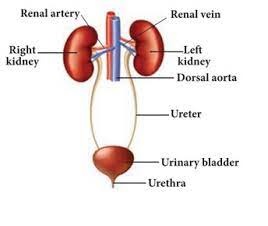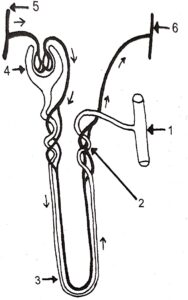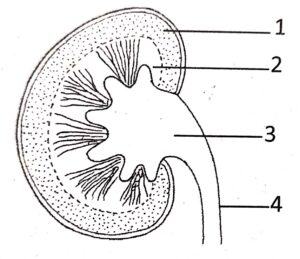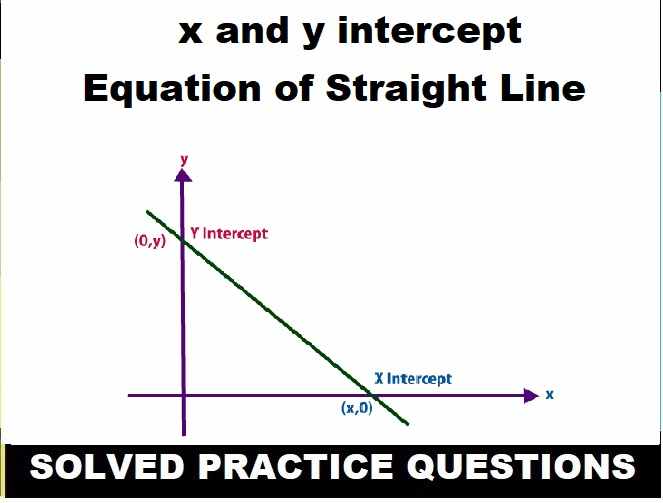Excretory System Srijan Publications Solutions ICSE Class-10 Ch-9. We Provide Solutions of Very Short Answer Type, Short Answer Type, Long Answer Type Questions and MCQs of Exercise-9 Excretory System Srijan Publications ICSE Class-10 Ch-9. Visit official Website CISCE for detail information about ICSE Board Class-10.
Excretory System Srijan Publications Solutions ICSE Class-10 Ch-9
| Board | ICSE |
| Publications | Srijan Publications |
| Subject | Biology |
| Class | 10th |
| Writer | Veer Bala Rastogi |
| Chapter-9 | Excretory System |
| Topics | Solutions of MCQs, Very short and Short Long Answers Questions |
| Edition | for 2022-2023 Academic Session |
A. VERY SHORT ANSWER TYPE QUESTIONS
Ch-9 Excretory System Srijan Publications ICSE Class-10 Biology Solutions
(Page-132)
Questions 1. Fill in the blanks with suitable words.
(a) In …efferent,… arteriole blood flows with greater pressure than in …afferent…… arteriole.
(b) Ammonia is converted into ...Urea… in liver
(c) Afferent renal arterioles are ….Broader……….. than efferent renal arterioles.
Questions 2. Match the columns:
| Column A | Column B |
| (a) Cortex | (i) Ureter |
| (b) Nephron | (ii) Renal tubule |
| (c) Proximal convoluted tubules | (iii) Glomerulus |
| (d) Pelvis | (iv) Kidney |
| (e) Malpighian capsule | (v) Ultrafiltration |
Answer :
| Column A | Column B |
| (a) Cortex | |
| (b) Nephron | |
| (c) Proximal convoluted tubules | |
| (d) Pelvis | |
| (e) Malpighian capsule |
Questions 3. Give one word for the following:
(a) The bean-shaped structure that helps in excretion and osmoregulation
Ans: Kidney
(b) Ammonia, urea and uric acid that are removed from the body.
Ans: Excretion
(c) The blood vessel that supplies blood to kidney.
Ans: renal arteries
(d) The capillary network around the renal tubule.
Ans: peritubular capillaries
(e) The convoluted part of renal tubule that opens into the collecting tubule.
Ans: DCT
(f) The functional unit of kidney.
Ans: nephron
(g) The substances excreted by kidney.
Ans: urea and creatinine
(h) The nitrogenous waste in human urine and the organ it is produced in.
Ans: Urea
(i) The metabolic process in which CO2 is released.
Ans: cellular respiration
B. Short Answer Type Questions
Ch-9 Excretory System Srijan Publications ICSE Class-10 Biology Solutions
(Page-132)
Answer the following questions:
Questions 1. Why do we feel more thirsty in summer but less in winter?
Answer :the process of regulating the concentration & osmotic pressure of blood by regulating the water content of blood plasma. Kidneys are the organ of osmoregulation in human body, if water content is more in body they excrete more water in urine and vice-versa
Questions 2. What will happen if one of the two kidneys of man is damaged?
Answer : if one kidney is removed from the body of a human being? Nothing happens and the person will survive and remain normal. The remaining kidney will become hypertrophied.
Questions 3. Explain why the frequency of urination is generally more in winter than in summer.
Answer : The result is that our body gets warmed up. In order to maintain the blood pressure normal, the excess water along with the wastes is excreted mostly in the form of urine. This is the reason for more urine out put and frequent urination under very cool conditions and in winter.
Questions 4. On a cool and wet day, a large quantity of dilute urine is passed out by most people. Why?
Answer : Because less blood reaches the skin, heat loss is reduced and the body overheats. So, the correct option is “A” (There is reduced loss of water through sweat).
C. Long Answer Type Questions
Ch-9 Excretory System Srijan Publications ICSE Class-10 Biology Solutions
(Page-132)
Questions 1. Answer the following questions:
(a) Define excretion.
Ans: The matter, such as urine or sweat, that is so excreted. Excretion is defined as the process of expelling waste matter, or the waste matter expelled by this process. When a person goes to the bathroom to urinate, this is an example of excretion. Urine is an example of excretion
(b) Name three different steps involved in the formation of urine in the kidney.
Ans: glomerular filtration, reabsorption and secretion.
(c) Mention the functions of nephron.
Ans: A nephron is the basic structural and functional unit of the kidneys that regulates water and soluble substances in the blood by filtering the blood, reabsorbing what is needed, and excreting the rest as urine
(d) What is ultrafiltration? How is it achieved in mammalian kidney?
Ans: Ultrafiltration is the removal of fluid from a patient and is one of the functions of the kidneys that dialysis treatment replaces. Ultrafiltration occurs when fluid passes across a semipermeable membrane (a membrane that allows some substances to pass through but not others) due to a driving pressure
(e) How does kidney help in osmoregulation?
Ans: the process of regulating the concentration & osmotic pressure of blood by regulating the water content of blood plasma. Kidneys are the organ of osmoregulation in human body, if water content is more in body they excrete more water in urine and vice-versa
Questions 2. Draw labelled diagrams of the following:
(a) Excretory system in man
(b) Nephron
(c) L. S. of human kidney
Answer :
(a)

(b)

(c)

— : End of Excretory System Srijan Publications Solutions ICSE Class-10 Ch-9 Biology :–
Return to :- Srijan Publication ICSE Biology for Class 10 Solutions
Thanks


